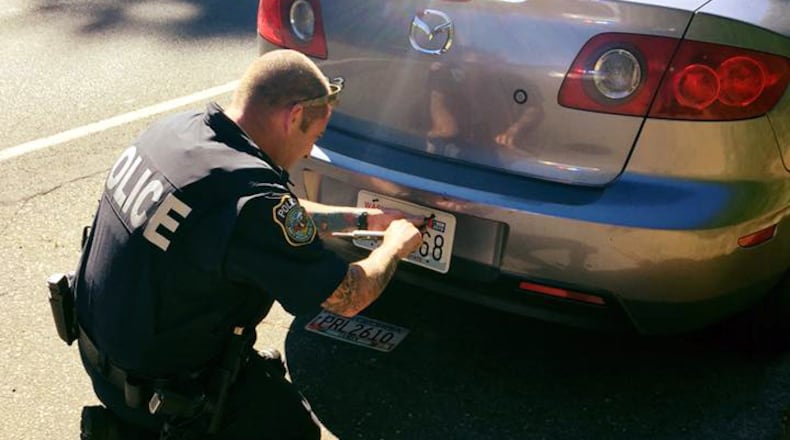- Micropreemie beats odds, finally goes home after nearly a year in hospital
- Officer's response to distraught driver who just learned of sister's death goes viral
- Man accused in kids' deaths yelled at by judge for what he wore in court
- What happens 1 hour after you drink a Coke
- Audit finds millionaire living in public housing
The story of a local police officer that became a viral Facebook hit started with a simple traffic stop on Friday.
A woman who was 38-weeks pregnant had expired license plates. Instead of getting a ticket, Officer Jim Allen helped her replace them.
“Today you don't hear about the officers who actually do good, but I wanted to be one of the people to give credit when it's due,” the woman, Amby Johnson, told KIRO 7 in a story that so far has reached more than 3 million people.
Allen received several complimentary notes Saturday morning -- from high-ranking officials, family, co-workers and friends. He was encouraged that something positive was being shared.
“We’re human too and we need to have compassion,” he said.
Allen, who is an officer at Naval Base Kitsap-Bangor working for the Department of Defense, explained that he stopped to help the military officer who had contacted Johnson. (Follow this link to read more about the traffic stop from Johnson's perspective.)
After their quick discussion, it was clear that helping Johnson with her license plates would be much more beneficial than a ticket.
The key in every stop should be compassion, Allen said.
All the people he contacts aren’t always receptive. Some are violent criminals. Some traffic stops come after serious offenses that put lives at risk.
“But no matter what their demeanor, that person is someone’s brother or mother or sister or uncle or cousin,” Allen said.
Johnson also had her own Facebook post shared thousands of times after posting it Friday.
She said on Saturday that she’s appreciative of the positive comments, but said it was frustrating to see negative people who made the discussion about race.
“Just see the story for what it is,” she said. “A good officer helping out a woman. No race.”
Allen said he’s seen disturbing police video on the news, and some of those incidents weren’t handled as well as should have been. Some officers slip through the cracks. But they’re not the majority -- and people catch onto to them, he said.
Allen’s also seen dozens of moments like the one that made him a viral Internet hit this weekend.
At least once a week Allen said he’ll see a fellow officer helping someone or discussing a stop instead of routinely giving tickets. Most of those moments go unnoticed.
“I truly believe that if you’re coming into this line of work it’s because you want to make a difference,” Allen said. “You want to work in your community to make it a better place.”
He comes from a military family. Allen’s father was in the Air Force, which took him all across the country as a kid: Alaska, Arizona, Texas, Washington. All four of his brothers were in the Navy, and his sister and his sister married a man from the Air Force.
He enlisted in the Army and served from 1996 to 1999 and is now in the Navy Reserve. After his Army service, Allen worked with the State Department as a private contractor in Afghanistan.
He transitioned to the police officer job in 2009 so he could spend more time with his wife, daughter and twin boys.
On Saturday he was on the shores of lake Washington with his 3-year-old sons watching the Blue Angels.
And every time he looked down at his phone, Allen had more messages about the photo that had gone around the world.
The way he acted in that that traffic stop is the way he hopes people will treat one another.
“If it was my mother or sister, I would hope somebody would try to make it a fruitful, productive contact instead of something negative that would leave them with a bad feeling,” Allen said.
“You’re going to have a better relationship with the community if you have discretion once in a while. It goes a long way.”
About the Author
The Latest
Featured


